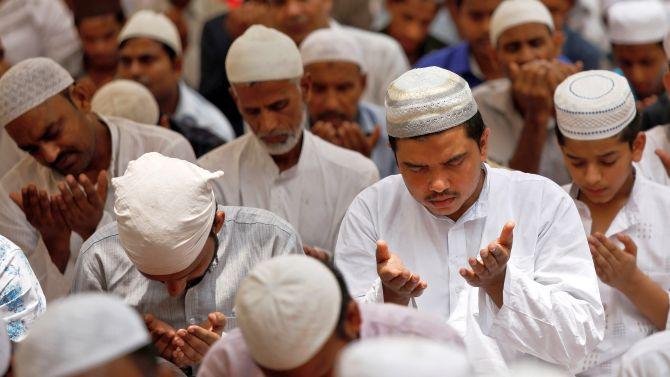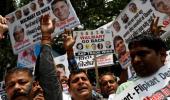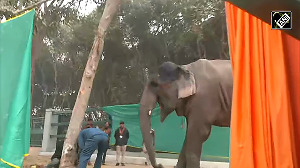'This time, even the professedly secular parties have maintained a conscious distance from being identified with Muslims.'
'This could be interpreted as a success of the BJP campaign of what it has been calling 'minority appeasement', says Mohammad Sajjad.

Something unusual happened with(in) Aligarh Muslim University this election.
Rather than being looked upon by north Indian Muslims for some suggestions towards whom to vote, it found itself under serious attack and threat.
Uttar Pradesh Chief Minister Ajay Singh Bisht -- aka Yogi Adityanath -- on April 11 in his election meeting at Atrauli in Aligarh said it was necessary to re-elect BJP MP Satish Gautam from the Lok Sabha seat to ensure reservations for the scheduled castes, scheduled tribes and other backward classes in admissions and jobs at AMU ('Elect BJP Candidate to ensure SC/ST Quota at AMU', Hindustan Times, April 11, 2019).
Bisht told the Atrauli meeting that India should not honour Jinnah who divided the country. This was a jibe at the controversy which was raised in May 2018 over the 1938 portrait of Jinnah in the AMU Students Union Hall.
The AMU's minority character is sub judice before the Supreme Court's Constitution bench. As of now, the AMU does not have reservations for SCs, STs, OBCs nor does it have any religion-based reservations.
Till the judgment comes out, AMU is under no compulsion to comply with the BJP's arm-twisting.
But, then, political parties desperate to extract votes over Hindu-Muslim polarisation have no other way but to indulge in all such provocations. High-profile political leaders campaigned in Aligarh, which went to the polls on April 18 (Aman Sharma, Economic Times, April 12, 2019).
Besides the provincial and national implications of these contestations, there are some immediate local considerations as well.
The Aligarh Lok Sabha seat has a Jat candidate, Ajit Balyan, from the Bahujan Samaj Party in alliance with the Samajwadi Party. It made the BJP even more tempted to raise issues which could help it attract Dalit votes, away from the BSP.
A rough estimate of votes by local political workers of different parties tell us that the Aligarh Lok Sabha seat (out of the total voters numbering around 15.5 lakhs) has 21% Muslims, 9% SCs, 5% Yadavs and over 40% Savarnas.
The Congress nominee, Vijendra Singh, a Jat and former MP, may cut into Jat and Muslim votes. A greater chunk of non-Yadav OBCs and non-Jatav Dalits may vote for the BJP. In that case the contest between the BSP and the BJP appears to be quite close.
This possibly made the BJP a little more desperate to resort to create religious polarisation and majoritarian consolidation.
It is this unprecedented majoritarian consolidation which has sort of rendered Muslim electorates almost irrelevant. This election, therefore, witnessed a muted and silenced Muslim.
This is where we didn't find the AMU campus being wooed by the political parties, which it used to be in almost every election.
The AMU Students Union as well as the AMU Teachers Association did not pass any resolution appealing to Muslims to vote for or against a party -- a rare act of political 'indifference'!
What does it signify?
Since the 1946 elections, groups of students would go out for election campaigns in various parts of India, specially UP, Punjab and Bihar from where most students came to AMU. Post-Independence, they campaigned in UP and Bihar. They punched, rather much above their weight, to jockey and lobby for their preferred candidates/parties.
Not only AMU, the Muslim religio-cultural organisations such as Jamiat-ul-Ulema-e-Hind (JUH, founded in 1919), 'Shahi' Imam Bukhari, Jamaat-e-Islami-e-Hind (JIH, founded in 1941), Imarat-e-Shariah (Patna, founded in 1921) used to be approached by major political parties to issue an appeal for Muslim electoral favours.
This 'politics of the pulpit' seems to be dying its death, which in the long run may pave the way for a far more democratised politics.
Though its remnants can still be seen in ticket allotment by parties like the RJD-led coalition, which has whimsically foisted certain candidates upon the Muslim electorates, in Motihari, Sheohar, etc).
This time, even the professedly secular parties have maintained a conscious distance from being identified with Muslims and their pressing issues of security of life and property, as much as away from their religio-cultural organisations.
This could be interpreted as a success of the BJP campaign of what it has been calling 'minority appeasement'.
Pertinently, this accusation of appeasement had nothing to do with a preferential treatment of Muslim communities in terms of concrete educational and economic empowerment.
It was simply signifying the 'secularists' as pandering to Muslim conservative forces. It was at best a symbolic reaching out, and cooption for, immediate electoral gain and symbolic window-dressing, in terms of some Muslim notables becoming legislators.
So much so that even the BJP, in 2004, had to cobble together a 'Vajpayee Himayat Committee', comprising of some Muslim notables, for the purpose of attracting Muslim votes.
Such an arrangement dispensed with holding Muslim legislators (and other elite brokers) and their respective parties accountable for and answerable to the real needs of the community.
This is how Muslim institutions and individuals stand discredited and delegitimised, and have also been rendered as political pariahs.
Politics, like nature, abhors a vacuum.
Now the issue is: What kind of forces will really fill this vacuum?
The arrogant manner in which the RJD-Congress ignored nominating candidates from the Ajlaf-Arzal segments of Muslims, and also the emergence of many smaller, caste-based outfits in Bihar and Uttar Pradesh, entering into one or the other coalition, possibly suggest something about the incipient trends.
Disappointed with that, the 'Pasmanda' intellectual activists have already begun to think of launching a small political party of their own.
Smaller formations like the AIMIM (in pockets of Andhra Pradesh, Telangana and eastern Bihar), Peace Party (parts of eastern Uttar Pradesh), AIUDF (Assam), etc, will emerge in various parts.
But this symptom is certainly not Muslim-specific. The emergence of smaller caste-based formations such as the Nishad Party, the Suheldeo Party, Apna Dal, Vikas-Sheel Insan Party, etc, should also be seen in the same context and within the same prism.
Since the big national and regional parties are not addressing the concerns and political aspirations of certain groups, such smaller sub-regional forces will align with other formations of similarly disenfranchised groups, and with them, will stake a claim to slices of the political cake.
In other words, an era of fission of mega parties and fusion of granular formations/coalitions may emerge.
Needless to say, the mega parties have become like oligarchic fiefdoms of specific dominant castes and dynasties. Hitherto disenfranchised groups are increasingly rising up to be acknowledged by, and to bargain with, the dominant forces.
This scenario possibly explains the political 'irrelevance' of the AMU and other Muslim religio-cultural bodies which seem to have lost their pan-Indian political appeal. This possibility of diffused and disaggregated Muslim politics would possibly pave the way for a further deepening of democracy.
Notwithstanding the big limitations of identity politics, it is this entrenchment of democracy which is sought to be thwarted by the homogenising and hegemonic reactionary forces.
The way forward for the subjugated groups of India in general, and for Muslim communities in particular, possibly lies in trumping the homogenising reactionary forces.
Will it happen in this election, or will this inevitability have to still wait for some more time?
Do the intelligentsia sitting cosily in better-funded universities really foresee the above mentioned possibilities and its implications?
Mohammad Sajjad is a Professor at Centre of Advanced Study in History, Aligarh Muslim University.











 © 2025
© 2025